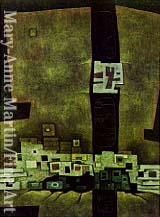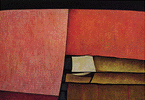I first saw a painting by Gunther Gerzso at
the Galería de Arte Mexicano.
It was my first trip to Mexico and I had come to pay my respects to the
famous art dealer, Inés Amor. After a quiet talk with this
extraordinary woman, who had the ability to make first time visitors
feel like long lost friends, she asked me if I would like to see some
paintings by contemporary Mexican artists. At that time I was a
cataloguer of modern paintings at Sotheby's and was familiar with only
the biggest names-Rivera, Orozco, Siqueiros. Occasionally we had a
Tamayo, too. I eagerly accepted Ms. Amor's invitation and she showed me
several works. The Gerzso stands out in my memory. The colors were
vibrant and the surface was glassy and cold. I remember my reaction as
one of puzzlement. With all my art historical preparation and my years
of training in an auction house, I was unable to place this painting in
a convenient pigeon hole. It reminded me of no Mexican painting I had
ever seen and even less of the European ones I was used to.
So many
years later, with thirteen years in an auction house behind me and
thirteen years since I started my gallery, I still know no painter
quite like Gunther Gerzso.
I'm not exactly sure of the first time that
I met him. The Gerzso house in San Angel felt like a cool sanctuary
with leafy gardens visible from within. I immediately liked this
avuncular figure with a sardonic wit who reminded me of my Viennese
father. "I was assembled in Mexico," he told me when I ask him about
his European ancestry. I liked his wife Gene, who had her own sense of
humor and who understood what made Gerzso tick. There were acres of
bookshelves and paintings hanging everywhere. The Gerzsos were people
that I would have liked to be with under any circumstances. That
Gunther happened also to be a great painter was a fact completely
apart.

5. Presence of the Past, 1953
|
Going up to Gunther's studio for the first time
is impressive. There is an exterior staircase leading to a room with an
alcove. Everything seems spotless. No drips of paint on the floor, no
evidence of furious creativity. Just one painting in progress on the
easel, and possibly a work that is finished and wrapped up neatly in
brown paper waiting to be picked up. More books. A collection of tacky
snow domes sent from all over by friends who know he thinks they are
funny. If Gunther feels expansive he will open up a few drawers in the
flat files and show you some recent prints. Or he will take you to the
"Cemetery," where he keeps paintings that he has started and has
abandoned at some stumbling point. Sometimes he will show you a work
from a style that he tried and discarded-perhaps a dada collage. On
another occasion he will give you a glimpse of his archives. Here he
keeps a pencil sketch of almost every painting he has made, together
with notations about the medium, its present whereabouts. In most cases
he has a good transparency of the painting as well. In this meticulous
record keeping he is like Klee or Kandinsky.
The comparison to
Kandinsky is not accidental. Gerzso's studio is orderly, his mind is
disciplined, his paintings are the product of a reasoned aesthetic.
Here is visual music: endless themes and variations, full of harmony,
color, discordant notes, tensions and peaceful resolutions. Gerzso
works like a composer, orchestrating his compositions. He cannot run
out of ideas; the notes can be replayed in countless arrangements.
Gunther Gerzso is Mexican. Trained in Europe not as a painter but as an
art historian, he returned to the land where he was born and developed
an artistic vocabulary that is his alone. He copies no other master. He
celebrates the landscape of Mexico and its pre-Columbian beginnings. He
paints the heart and soul of Mexico.











